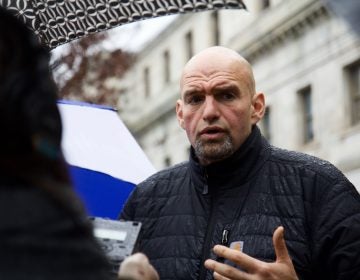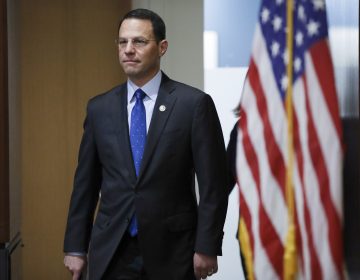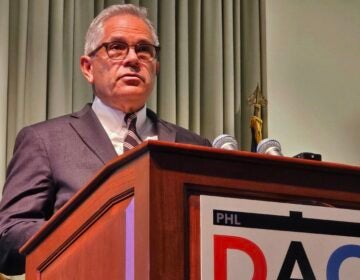As critics slam him on gun violence, Philly DA Larry Krasner looks past election to next term
Krasner sees his decisive primary victory as a mandate for his progressive policies. Those on the front line of gun violence offer nuance to the claims of his critics.
Listen 4:51
Philadelphia District Attorney Larry Krasner (left) and challenger Chuck Peruto. (Larry Krasner/Charles Peruto)
It’s extremely likely that come Nov. 2, Philadelphia District Attorney Larry Krasner will win another four years as the city’s top prosecutor.
Sitting in his Center City office about a week before the general election, in which he’ll face Republican defense attorney A. Charles Peruto Jr., Krasner wasn’t sweating it. “It’s going to be close,” he whispers sarcastically when the subject comes up, with the confidence of a man who knows his city overwhelmingly prefers Democrats.
If not his race, there are things Krasner says he is thinking about very seriously: namely, how to approach his second term as a staunch progressive, anti-mass incarceration prosecutor amid a historic spike in gun violence.
Many of Krasner’s decisions since he took office have been controversial. He has gotten rid of bail for a host of minor crimes, and says the office has almost totally stopped charging juveniles as adults. They no longer charge for prostitution, or for possession of buprenorphine or marijuana. The department website prominently displays statistics it considers key to its mission: Compared to the previous DA term, the office has imposed 24,000 fewer years of incarceration and 102,000 fewer years of supervised probation or parole. In addition, there have been 23 exonerations of people serving sentences for which he says a review found insufficient evidence.
Critics often cite the same facts when explaining what’s driving the rise of certain violent crime in the city — namely gun homicides, which also increased in many other cities across the country during the pandemic.
An ongoing point of contention, for instance, between Krasner, Philadelphia Police Commissioner Danielle Outlaw and Mayor Jim Kenney, is whether Krasner’s prosecutors have been aggressive enough in seeking penalties for people caught illegally carrying guns. Both Kenney and Outlaw have said conviction rates for those crimes are too low, and say they believe that’s making neighborhoods more dangerous. So far this year, 450 people have been killed in homicides in the city. That number was 399 at the same time last year, and 283 in 2019.

Krasner acknowledges that conviction rates for illegal gun possession fell from 63% to 49% between 2017 (just before his tenure began) and 2019, the last year before the pandemic delayed trials and threw conviction rates into disarray.
He thinks some of that change was good — the office kept select offenders from conviction by routing them through a diversion program meant to reduce incarceration. He pins much of the rest of the decline on police giving him weak cases.
His challenger, Peruto, has attributed the rise in violence to the city’s trend away from stop-and-frisk policies. Krasner says it’s possible that shift has at least partly caused his office’s lower conviction rate in gun possession cases. Police, he says, have largely replaced random searches of individuals with searches of cars during traffic stops, which can produce less clear evidence of gun ownership. He thinks it’s all bad — and adds, he doesn’t think simple gun possession necessarily leads to violence anyway. He’d rather see police improve their rate of solving shootings.
“I would love to see the police department — and I’ve told them this — use wiretaps,” he said. “Let’s take a serious investigative effort here, as opposed to, ‘Gee, there’s some Black kids, let’s search them. Oh my, there’s some Black kids in a car. Let’s search the car.’”
It’s just one example of the differences Krasner has with other key leaders he needs to work with, including Outlaw, in order to achieve his goal of stemming violence while reducing mass incarceration in the city.
The DA seems emboldened by the debate. And despite not winning support from city Democratic Party leaders in the primary, with challenger Carlos Vega getting backing from Democrats including former Gov. Ed Rendell, Krasner takes his resounding victory in that race as a mandate. Contemplating his likely second term, he mostly comes to one conclusion: Stay the course.
“We have to continue to do what we said we would do, what we promised we would do,” he said. “We did all kinds of stuff that was unexpected … and we [won the primary] because people want us to keep doing what we’re doing. And that is primarily where we are going to go.”
The alternative
Krasner’s primary win illustrated his appeal among city voters.
He beat Vega, a former assistant district attorney, by about 30 points. In many of the precincts most affected by gun violence, he won by even bigger margins.
Turnout, though, as can often be the case in municipal primaries, was low. Krasner won with about 129,000 votes to Vega’s 64,000, with the challenger picking up his biggest victories in precincts in Northeast Philadelphia.
Peruto, the loose-talking 66-year-old defense attorney running a long-shot Republican challenge against Krasner, knows this well. He says he stumbled into a crowd that was decisively unsupportive of his policy proposals in Fishtown’s Penn Treaty Park, a Krasner-sympathetic area, where he was holding a rally on probation and parole.
“We were not met with a friendly audience, that’s for sure,” he said. “Not at all. We were lucky to get out of there alive.”
Peruto explains this from a truck circling City Hall, towing a massive billboard emblazoned with his name and face, and the message “4 more years of Krasner will be too late.” He talked to a reporter about his campaign in between quips into a microphone hooked to a speaker in the truck bed, telling the lunchtime crowds to “vote Republican just this once,” and that “crime without consequences gives us more crime.”
He does this every day around noon, accompanied by Marty Baker, a supporter who built the sign. When he has time, he’ll take the truck around the city to try and get his message to more ears. He notes, it’s tough to raise money as a Republican in Philly, where Democrats outnumber the GOP about 7 to 1. Advertising is expensive. But a truck and a speaker are relatively cheap.
Peruto’s platform, as he explains it to onlookers near City Hall, is simple.
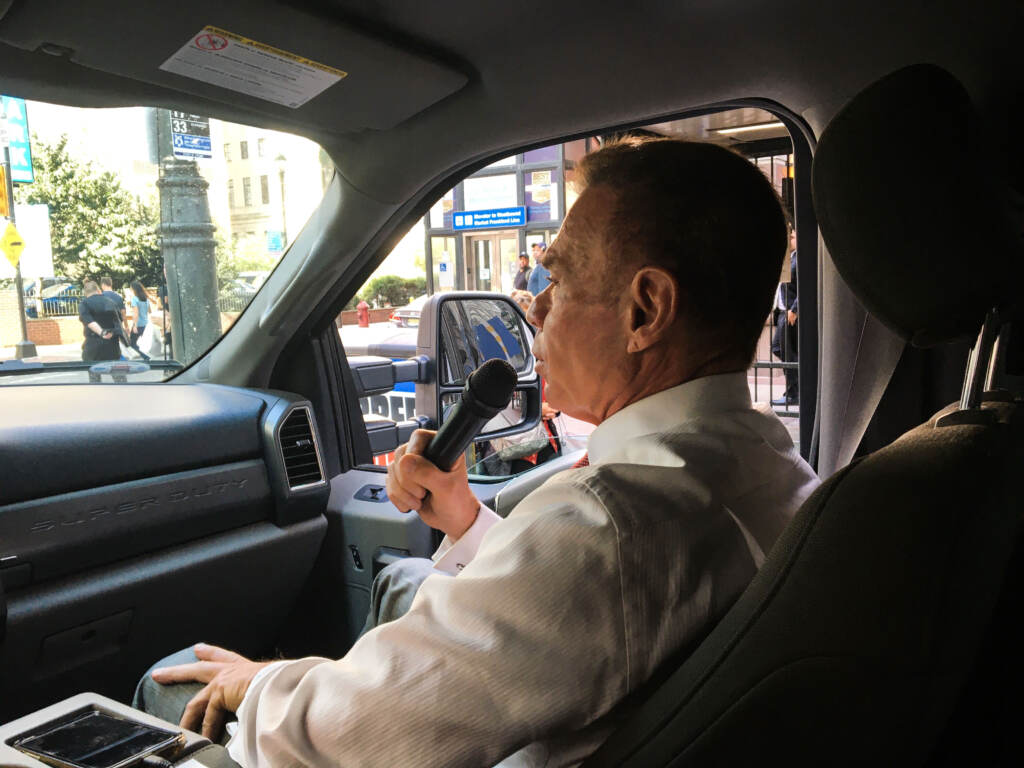
“Larry Krasner has no plan to attack shooting and gun violence,” he said. “He has demonstrated that for the last four years, and now we’re asked to give another four years. This is a failed experiment.”
When he puts the microphone aside for a break, he sums it up even more simply.
“Some human beings are bad and some are good and some prey on the good,” he said. “And we have to protect the good.”
Among many other proposals and musings on his campaign website — including his feelings on when to use the death penalty and the problem of “black-on-black crime” — Peruto is specifically proposing lengthy sentences for any gun-related offenses, including at least two years for illegal possession.
But besides the policy disagreements between himself and Krasner, he also thinks there are key personality differences.
“To have a war in the press — that Larry is having with police — it’s not good for anybody because then nothing gets done,” he said. “You need to be having dinner with somebody somewhere every night to see if you could find a common ground to solve things. If you’re not going to find that common ground or even attempt to, then nothing’s going to get solved.”
As Peruto’s truck makes its way through traffic, he gets an approving honk from a grinning officer in a police car, and a thumbs up from another cop on the sidewalk. These, he says, are some of his main supporters.
“A hundred percent of cops that I’ve talked to were for me. A hundred percent of people who know me are for me,” he said. “People who don’t know me question my motives.”
On the ground
Ahead of the 2021 primary, one of the key questions Krasner’s campaign had to answer was whether the Philadelphians most affected by soaring gun violence rates would still be on board with his criminal justice vision.
The answer in the vote tallies was unequivocally, ‘yes,’ even as those communities continue to suffer from the bloodshed. As people who work in grassroots gun violence intervention prepare to likely deal with this DA’s office for another four years, they have their own insights — and criticisms — for Krasner.
One of the many people who got on board with Krasner’s reform promises in 2017 is Tyrique Glasgow, who runs a South Philadelphia violence intervention group called Young Chances.
“It was a holistic thing,” Glasgow said. “He wasn’t saying that he wasn’t going to incarcerate [people], but he understood some of the undercurrent issues, from the systematic racism to some of the deals and the sentences that didn’t really reflect the crime.”
Glasgow operates closely with city officials and spent five years working for the DA’s office, including two years under Krasner. But he’s also not a person easily impressed by politicians. He prefers a grassroots approach, firmly believing that communities struggling with poverty and violence need trusted communicators who can relate with vulnerable young people. He doesn’t think elected officials always get that. “The bar is low,” he explained.
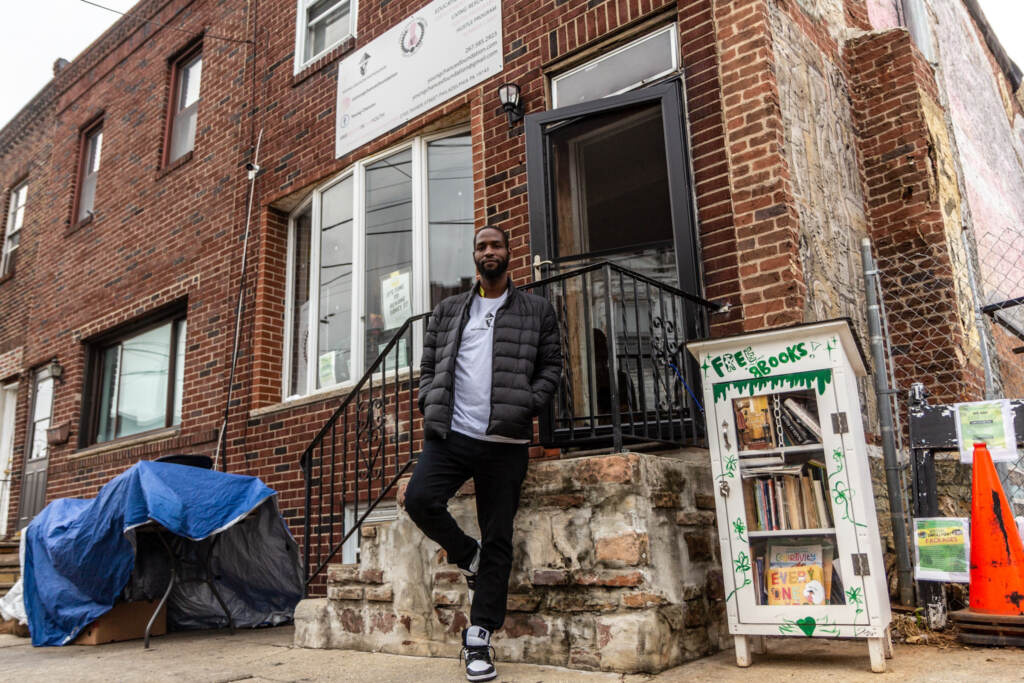
And he says at times, he’s been frustrated with the way Krasner’s office has operated. His main gripe actually isn’t that dissimilar than one of Peruto’s: He thinks the DA needs to work in concert with the mayor’s office and the police in order to truly address those root issues, poverty and racism. Some more compromise, he said, might be a better use of time than infighting.
“The back-and-forth with the police commissioner … it seems like when they’re having their little fights back and forth on what’s more important, which policy is more important than the other, it takes away from what’s needed,” he said.
This is all personal for Glasgow, like it is for many people who grew up in his Grays Ferry neighborhood.
Between the ages of 20 and 22, Glasgow says he was shot 11 times. He went to prison at 23, convicted of manufacturing and selling drugs. Not long after he got out, he started Young Chances, which now operates out of a Tasker Street rowhouse that’s packed with donations for the community, and has spaces where local kids are encouraged to spend time.
On a warm weekday afternoon, several of those kids and teenagers hung around the sidewalk outside Young Chances, along with Glasgow and two police officers who serve as community liaisons from the 17th Police District. Over the past several years, Glasgow has struck up a close relationship with the 17th that surprised even him. When he was first invited to come by for a meeting, he refused and met an officer in a playground instead.
This area has lately become a minor success story for the PPD. While shootings have been up across the city, they’ve gone down nearly 50% in the 17th District compared with this time last year. There’s rarely a single reason why crime rates fluctuate, and people are still dismayed by the level of violence here, but both community officers, James Dougherty and Kimberlee Hickinson, say they feel they’ve made some progress.

People like Glasgow have “street credibility out here, and that was something that we were missing, I think, in the 17th District for a while,” Dougherty said. The goal, Hickinson added, is to strike “a delicate balance” between locking up bad actors and forming positive relationships.
“That evasive middle is what we’re always seeking,” she said.
Glasgow isn’t the only Krasner supporter watching him closely, and critiquing the areas where they feel he’s falling short.
Colwin Williams is another. Like Glasgow, he has spent time in prison — nearly two decades for armed robberies — and has dedicated a lot of his life since he got out to activism. He serves as a violence interrupter and street supervisor for the nonprofit Cure Violence, and is mostly based in West Philly.
Lately, he says, he’s just been tired. He feels like he’s watching shooting after shooting, and it’s hard to feel like anyone is actually doing enough to stop them. He doesn’t want these deaths to feel routine, and he worries that without getting much more embedded in communities, the DA’s office can’t understand how bad things are.
“Do you really know the people?” he asked. “Have you ever sat down and had a mom collapse in your arms because her son just got murdered? We’re in the hospitals responding to the families and parents when they get shot. Nobody’s there … The sound bites stop after they tell you it was a shooting … after that, you don’t hear nothing.”
Williams wants to feel like someone is listening. But just because he doesn’t always feel the DA fully appreciates what people in his community are going through, it doesn’t mean he’s swayed by people like Peruto, and his more aggressive approach of putting more people in jail.
Krasner, Williams says, has a lot on his plate. “A lot of this stuff he inherited.” For all his frustration and lost sleep spent wishing that city government would be more responsive to his community, he has no doubts about his choice.
“I love him,” Williams said of Krasner. “He’s getting my vote again.”
Glasgow fundamentally agrees. He thinks focusing on de-incarceration and overhauling the criminal justice system is the right approach, and he remains confident it’ll make things better in the long term. It can just be hard to wait for the long term to come, especially while watching the number of annual homicide victims climb higher than it has been in decades.
“It’s frustrating. It’s challenging,” he said. “But I grew up in a church. My grandmom and them always said ‘weeping may endure at night, but joy comes in the morning.’ So hopefully we’re doing a lot of weeping now, and our joy is coming soon.”
He, too, will vote for Krasner on Nov. 2.
WHYY is your source for fact-based, in-depth journalism and information. As a nonprofit organization, we rely on financial support from readers like you. Please give today.



